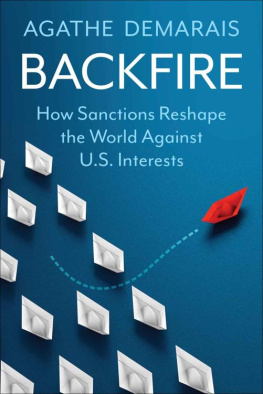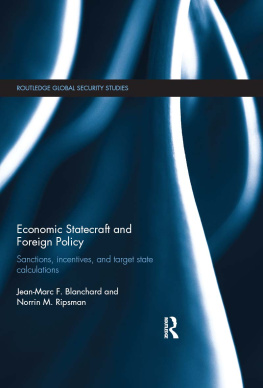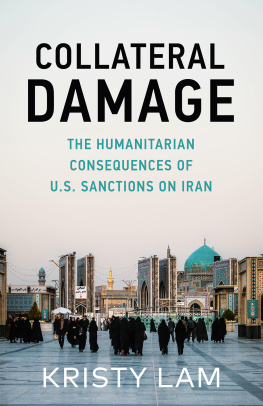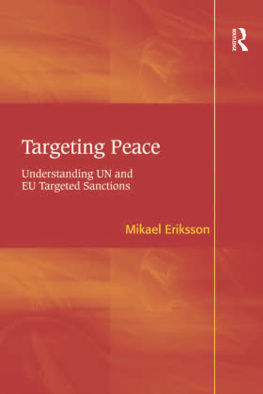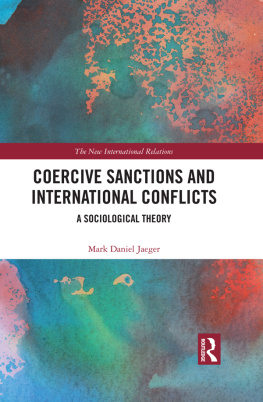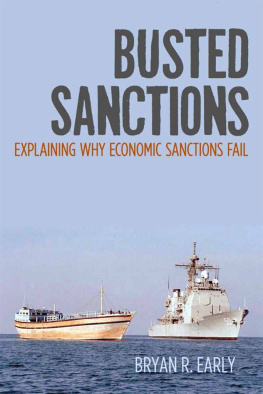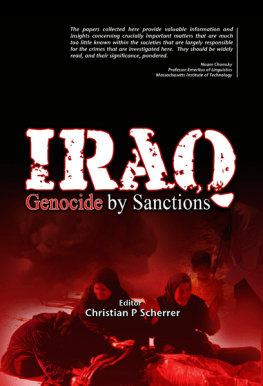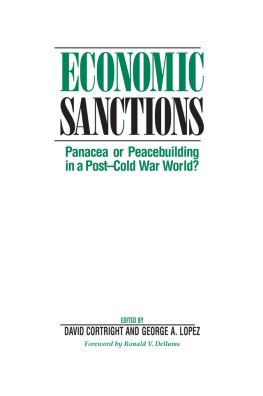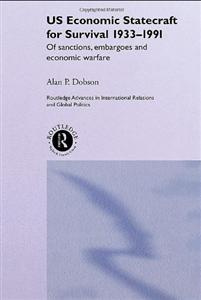THE ECONOMIC WEAPON
THE
ECONOMIC
WEAPON
The Rise of Sanctions as a
Tool of Modern War
NICHOLAS MULDER

Copyright 2022 by Nicholas Mulder.
All rights reserved.
This book may not be reproduced, in whole or in part, including illustrations, in any form (beyond that copying permitted by Sections 107 and 108 of the U.S. Copyright Law and except by reviewers for the public press), without written permission from the publishers.
Yale University Press books may be purchased in quantity for educational, business, or promotional use. For information, please e-mail (U.K. office).
Book epigraph: G. W. F. Hegel, Lectures on the Philosophy of History, transl. J. Sibree (London: Henry G. Bohn, 1857), 298.
Set in Janson type by Tseng Information Systems, Inc.
Library of Congress Control Number: 2021939589
ISBN 978-0-300-25936-0 (hardcover : alk. paper)
A catalogue record for this book is available from the British Library.
This paper meets the requirements of ANSI/NISO Z39.48-1992 (Permanence of Paper).
Napoleon, in a conversation which he once had with Goethe on the nature of Tragedy, expressed the opinion that its modern phase differed from the ancient, through our no longer recognizing a destiny to which men are absolutely subject, and that Policy occupies the place of the ancient Fate [La politique est la fatalit]. This therefore he thought must be used as the modern form of Destiny in Tragedythe irresistible power of circumstances to which individuality must bend.
G. W. F. HEGEL, Lectures on the Philosophy of History
Contents
Acknowledgments
AS I GRAPPLED WITH the history of economic sanctions, I incurred many debts to mentors, colleagues, interlocutors, friends, and family, all of whom helped give shape to this book and bring it into existence.
Throughout my time in the doctoral program in history at Columbia, I was immeasurably aided by my supervisor, Mark Mazower. An early enthusiast of the project, he subtly and incisively commented on many drafts and has provided a lasting model for how to think and write, historically and otherwise. The encouragement, energy, and generosity of Adam Tooze powered much of this project and made the last decade an invigorating experience. I would like to thank Susan Pedersen, whose seminar first inspired me to examine the impact of the Great War blockade and whose teaching and advice set an edifyingly high standard of scholarly commitment. I owe a debt to Samuel Moyn, who asked acute questions and helped expand the project toward the history of international law. I would also like to thank Lisa Tiersten for her kind support and always valuable advice. Natasha Wheatley got straight to the point with terrific advice on how to write the history of an actual thing. I also profited greatly from talking, reading, and learning with Charly Coleman, Victoria de Grazia, Martha Howell, Magorzata Mazurek, Timothy Mitchell, Camille Robcis, and Carl Wennerlind.
My colleagues at Cornell have been extraordinarily welcoming since my arrival in Ithaca. I am particularly grateful to Ray Craib, Cristina Florea, Maria Cristina Garcia, Durba Ghosh, Larry Glickman, Tamara Loos, Aziz Rana, Russell Rickford, Robert Travers, Aaron Sachs, and Claudia Verhoeven. A manuscript workshop allowed me to take in the helpful insights of Jamie Martin and Stefan Link. I also want to thank Robert Boyce, Patricia Clavin, David Edgerton, and Patrick Weil for reading and criticizing portions of the argument. Stimulating questions, conversation, and critique came from Fritz Bartel, Deborah Cohen, Mario del Pero, Nicolas Delalande, Michel Erpelding, Jeremy Friedman, Stefanos Geroulanos, Michael Geyer, Georgios Giannakopoulos, Daniel Immerwahr, Simon Jackson, Kostis Karpozilos, Duncan Kelly, Jan Lemnitzer, Jrn Leonhard, Fredrik Logevall, Charles Maier, Reid Pauly, Morten Rasmussen, Jennifer Siegel, Quinn Slobodian, Leonard Smith, Anders Stephanson, Marc Trachtenberg, and Karin van Leeuwen. For helpful comments, insights, and camaraderie, I am grateful to Benjamin Abrams, David Adler, Nader al-Atassi, Thomas Bottelier, Danielle Carr, Anusar Farooqui, Ted Fertik, Yakov Feygin, Pierre-Christian Fink, Freddy Foks, Kate Jackson, Anton Jger, Jeremy Kessler, Madhav Khosla, Aden Knaap, Max Krah, Johannes Lenhard, Dominik Leusder, Chase Madar, Clara Mattei, Flavien Moreau, Ben Mueser, Timothy Nunan, Orun Okan, Charles Petersen, Victor Petrov, Ryan Rafaty, Jerome Roos, Apratim Sahay, Maja Spanu, Daniel Steinmetz-Jenkins, Jan Stckmann, Boyd van Dijk, Jens van t Klooster, Camila Vergara, Darius Weil, Madeline Woker, and Alexander Zevin.
While conducting archival research in France, the United Kingdom, Germany, Switzerland, the Netherlands, and the United States, I benefited from the financial support of the Prins Bernhard Cultuurfonds; the Social Science Research Councils International Dissertation Research Fellowship (IDRF); the Columbia-Sciences Po Alliance Fellowship, enabling an affiliation with the Centre de recherches internationales (CERI) and Sciences Pos dpartement dhistoire, where I was supervised and helped by Jrme Sgard; the Chateaubriand Humanities and Social Sciences (HSS) Fellowship of the French Embassy in the United States; and the research funding of the Hoover Institution Archives.
My thanks are also due to those who hosted, assisted, and entertained me during this research trajectory: Grey Anderson, Nils Mangin, Birthe Mhlhoff, Alexandra Persegol, the Pisani-Ferry family, and Danilo Scholz in Paris; Stephen Wertheim in London; Hunter Dukes and Emma Vehvilinen in Cambridge; Ana Bogdan, Thomas Meaney, Saskia Schfer, and Jonas Tinius in Berlin; Yahya Khan and Yusra Mirza in Geneva; Alexander Clapp and Xenia Kounalaki in Athens; Daniel da Costa, Diana van Everdingen, and Arnoud van Thiel in Amsterdam; Elisabeth Rubinfien and Daniel Sneider in Palo Alto; and Ugo Mattei in Berkeley.
The project improved significantly as a result of talks and presentations at the Columbia Global Center in Istanbul; St Anthonys College, Oxford; the Institute for Historical Research in London; Sciences Po in Paris; the German Historical Institutes in Paris and Washington; the Universities of Tilburg, Amsterdam, and Copenhagen; a workshop with Charles Bright and Michael Geyer organized at Columbia University with Ted Fertik and Adam Tooze; Harvards International History Conference; and the Yale ISS Grand Strategy Workshop. I am grateful to Jonathan Eyal at the Royal United Services Institute for hosting me in conversation and to Mattias Fibiger for the opportunity to present a chapter to the BGIE unit at Harvard Business School.
At Yale University Press, I would like to thank my editor, Seth Ditchik, as well as Karen Olson, Kristy Leonard, Bojana Ristich, and two anonymous readers, for their interest, patience, assistance, suggestions, and extraordinarily efficient handling of the publishing process.
Finally, I owe much to my closest friends, family, and loved ones in the Netherlands, Belgium, New York, Ithaca, and elsewhere in the world. Thanks to the love, good judgment, wit, and curiosity of Sophie Pinkham, I was able to sustain and finish the project. This book is dedicated to my parents, Denise van de Leur and Taco Mulder, who have always supported me, up close and from afar, and helped me figure out the most important things. Of course, any errors that remain in the work are wholly my own.
Abbreviations
Organizations and Institutions
AA | Auswrtiges Amt (German Foreign Ministry), a.k.a. Wilhelmstrae |
|
Next page

